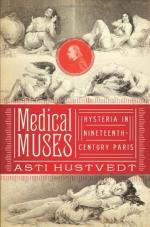|
This section contains 15,419 words (approx. 52 pages at 300 words per page) |

|
SOURCE: "The Uses of Male Hysteria: Medical and Literary Discourse in Nineteenth-Century France," in Representations, Vol. 34, Spring, 1991, pp. 134-65.
In the excerpt that follows, Goldstein argues that during the nineteenth century the phenomenon of male hysteria was developed through opposing interpretations: the medical community used it to reinscribe conventional gender definitions, while writers subverted such norms by associating hysteria with the desire for androgyny.
In the winter of 1867, Gustave Flaubert wrote to his good friend George Sand that he continued "to fiddle with" (tripoter) his current novel while living in complete solitude in the country. He passed entire weeks, he said, without exchanging a word with another human being and could perhaps best be compared to an anchorite whose "nights are black as ink" and who was "surrounded by a silence like that of the desert." In such an environment, he went on,
the sensibility becomes inordinately exalted...
|
This section contains 15,419 words (approx. 52 pages at 300 words per page) |

|


